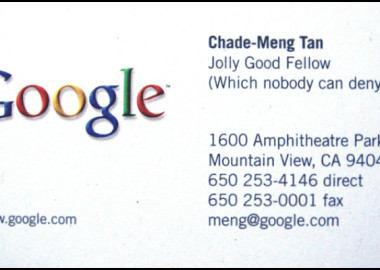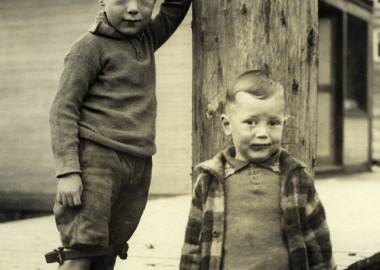
Last year, I was on the hunt for a job. I was coming off an extended maternity leave and looking to relaunch my career.
Job hunting is a slog: endlessly searching postings, telling every friend, former colleague and minor acquaintance that you’re in the market for a new gig, tweaking the cv, customizing cover letters. And then the joy and hope felt when the call comes through that you’ve got an interview … that turns far too quickly to anxiety and stress as you prepare to present this strange and perfect-seeming facsimile of yourself. You may have been there, too.
If you don’t tell your own story, someone else will.
One thing I noticed through the process was that employers asked for extra work outside of the interview: they presented various take-home exercises for me to complete after the second or sometimes third interview. This hadn’t been my experience in my previous job searches, but of course I was game (read: getting desperate), and appreciated that this was a good way for an employer to gauge the skills, talent and work ethic of a potential hire.
In one such case, after we’d built a relationship, the agency gave me a very intense exercise: three separate assignments, which took me the better part of two days to complete. I put in a lot of effort and felt good about my work. I submitted the exercises ahead of the deadline and waited for feedback. I got total silence. I followed up multiple times—silence. I felt ripped off; this company clearly had no respect for my time or for the skills I could offer them. Fine, I thought, if they didn’t want to hire me, but don’t leave a person hanging!
I felt upset for a while, and when it came up in conversation I told people about this disappointing behaviour by a reputed local agency—one working in the social good space, no less! When the annoyance faded, I came to understand that they likely hadn’t thought — or didn’t care — much about their Employer Brand.
The Employer Brand (And How to Define Yours)
Your Employer Brand is the image you present to both potential recruits and your current employees. In this age of reduced job loyalty, skills gaps, fickle staff, social media soapboxing and individuals’ ability to rate employers on sites like Glassdoor (or to write blog posts about a company’s hiring process, ahem), it’s essential to take control of, and shape, your Employer Brand to convey the right messages.
You’ve no doubt heard of the Googleplex and the Apple Campus, where employees of these tech giants reap the benefits of on-site gyms, cafeterias serving free meals with endless healthy options, quarterly free concerts, even transportation for commuters. The start-up version is more ping-pong table/Friday beers from the office fridge, but conveys a sense of culture and care nonetheless. These perks — plus standards like good compensation, adequate health benefits, a positive office environment and concern for work/life balance — are just part of a company’s Employer Brand.
The larger story there is that those brands value the happiness of their employees beyond the confines of the office, and want to help keep them healthy and happy. Story is at the heart of the Employer Brand.
Before we go much further, let’s be clear: we see two kinds of brand. The first is your company brand, which — simply stated — is the combination of your external reputation and visibility among your clients (past, present and potential) and people who might talk about, or refer you. That’s where brand story matters. In that, you’ll get at your company’s history, how it came to be, who was involved, and the successes and pitfalls on the way to success. It’s the story that compels customers to give you their time, their trust and their money.
The other kind of brand — and the topic of this post — is your Employer Brand, which is your reputation and visibility among potential employees and talent referral sources. The former is important for attracting new business and revenue opportunities, the latter is important for generating that revenue and (hopefully) its related profits.
Chances are that you already have an ‘outward-facing’ brand story (and if you don’t, here are some starting points for writing one — and some tools and resources to help clarify a fuzzy brand story).
Internally, though, you also need a story to guide and shape your Employer Brand. How does your business function on the inside? What are the day-to-day joys and challenges of being part of your company culture? How do your staff live the values that define everything you do? Do you, as a company, truly live the values you espouse, in taking care of your employees? These are the internal stories you need to define and shape, so that they don’t shape you.
Below I’ve included some starting points for telling these stories. It’ll be up to you to live them!
Careers & About Us Pages
Anyone interested in who you are as an organization, what you do, and whether or not you’re hiring, is going to spend some quality time on these two pages.
ECHO’S 10 Insights Into Our Culture are brief but compelling snippets of exactly what it’s like to work here. When I ultimately landed at ECHO, these tenets really spoke to me. They reflected back to me the way I live my own life and that was meaningful. Most importantly, they’re all true.
With over 90,000 hours of our lives spent at work, we want to enjoy where we are and who we work beside.
To recruit the best talent, then — and to retain great people in the long haul — use your website to convey the true essence of your business. Whether that involves annual company-wide family picnics or your infamous standing reservation at Friday-night karaoke at the bar downstairs, sharing true details about what makes you you as an employer can do much to attract just the right person to your company.
Job Postings
Not only do your job descriptions need to outline the skills required, they need to tell the story of the potential candidate’s every day. Include their duties, of course, but also try including what they can expect from the office culture, or how your company ensures engagement and open communication—especially if that candidate will be working remotely.
Your company’s core values should be front and centre in your job descriptions so that potential employees see that those values are the driving force behind how you do business (and live life). And don’t just list your values as three words on the page. Show how these come into play for your company by elaborating on what those values mean to you in your daily business dealings.
At ECHO, for example, this is a significant aspect in explaining a role to a potential hire. And it works both ways; our founder and president, Sam Reynolds, believes firmly in the power of storytelling to land a job. After all, we learn the most about a person by listening to their stories.
Hiring Process
As I hope my job hunt story illustrates, the hiring process can be fraught—for everyone involved. A candidate, of course, puts a lot of work into preparing an application; but you as the employer have much work to do, too. Truly understanding what you need in terms of talent and then finding the right candidate who meets those requirements is a time-consuming process. But it’s one that is well worth it if your aim is retention. Employee turnover is extremely expensive; ensuring you have the right fit from the beginning will go a long way to maintaining a healthy bottom line.
At ECHO, once we’re feeling fairly certain about a candidate, we get everyone involved and give each of our employees a chance to ask a question to the interviewee. It sounds intimidating, but it actually feels more like a group conversation.
I’ll never forget one of my future colleagues asking me, for example, whether my mind was more like a vacuum or a filing cabinet. In our industry, creative questions provoke creative answers. And we’ll forever more categorize people in one of these two ways.
And whether you hire the person or not, in the end, you must always, always get back to someone you interview. (Have I made that point yet?) It is a simple show of respect to let the candidate know that you appreciated their time; even better if you can provide them with strong feedback on the interview. Job seekers crave constructive criticism and want to know how they can improve their chances, either with another company or with you in another role (the person may not be the right fit for that particular job but is a right fit for the company). Keep their name on file and treat them well during the rejection process — you just never know when you may need them in the future.
The Takeaway on Employer Branding
Employer Brand boils down to your company’s reputation for how it treats its staff. And as a business owner, you want to be in total control of that reputation; the story being told about you as an employer should represent your values and your beliefs, so you ought to be the one to write it. And live it, too.





